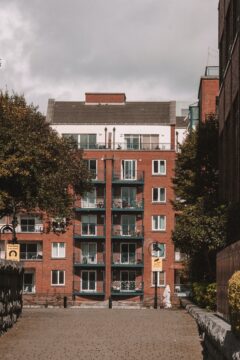Against a background of global conflicts, climate change driven disasters, high inflation, and ever-increasing energy prices the need for affordable housing is brought into focus.
The IUT stresses that safe and affordable housing is a universal human right and must be legally enforced in the constitutions, and legislation of every country across the globe, as well as a central pillar of all policymaking.
IUT President Marie Linder says,
– On the occasion of the International Tenants’ Day, we call on governments to enter a new deal with tenants for affordable rental housing.
In concrete terms, this means:
- That an affordable rent will apply that is related to the quality and location of a property,
- Ensuring that tenants are not evicted from their homes and that homelessness is combated,
- That renters are given a seat at the decision-making table.


Full statement: A new deal for affordable housing
Against a background of global conflicts, climate change driven disasters, high inflation, and ever-increasing energy prices the need for affordable housing is brought into focus. Homelessness must be combated.
The IUT is calling for a new deal for affordable housing:
Adopt good practice in the rental sector and adopt a no eviction policy
For tenants, the current rental levels, which often do not match the quality, are often barely affordable. Unserious rents must be vigorously countered. An affordable rent must apply that is related to the quality and location of a property.
No one should lose their home because the rent is too high
With many low- and middle-income tenants struggling, a moratorium on evictions would create stability for tenants and promote social equity as well as prevent displacement and homelessness from increasing.
Safe and affordable housing is a universal human right and must be legally enforced in the constitutions and legislation of every country across the globe, as well as be a central pillar of all policymaking.
Tenants’ organisations should have a seat at the decision-making table
It is important that tenants and Tenants’ organisations participate in making all plans for public housing and for the energy transition. This ensures supportive dialogue and the smooth running of the transition that is inevitable. National laws should give Tenants’ organisations the right of recognition, the advisory right, the right of consent and the right to provide professional support for tenants. These rights should apply to plans involving tenants’ homes in the neighbourhood, in the municipality and in policymaking by national governments.
Governments around the world should be capping energy prices and introducing compensation for increases in energy costs. Often the worst homes have the highest energy costs. Governments have to ensure that these homes are cost-neutral in terms of sustainability. All housing costs, including heating costs should be affordable for tenants.
Governments should be doing more to prevent discrimination: they have the responsibility to guarantee and safeguard that there is no discrimination on the rental housing market, on racial, religious, national, sexual orientation or other grounds.
Homes fit for tenants
Housing – as well as surrounding space and outdoor grounds – must be sound, healthy, and free from materials and substances that can harm human health. Residents must be protected by their governments against poor building practices and cost-cutting measures. Instead it should be ensured that buildings are built to withstand natural disasters, such as earthquakes, flooding, fires and climate change.
Tenants around the whole world are united in their fight against housing exclusion and homelessness and to make decent and affordable housing a right for all.


International Tenants Day originated in 1986 when the French tenant organisation CNL proposed a special world day for tenants. The board of the IUT agreed and decided on May 22 1986, to designate the first Monday in October as International Tenants’ Day. The IUT announces a theme each year but tenant organisations are of course free to choose their own topic/theme for this day.
The date chosen by the IUT Board was made with the background of the UN resolution taken in December 1985, by the UN General Assembly, to designate the first Monday of October every year as World Habitat Day.
Event suggestions include:
- Organise a discussion or debate either physical or online on how your city or community can act and contribute to a fairer deal for Tenants
- Organise a film screening either physical or online to bring people together in a common space and promote local creativity.
- Use this occasion to publicise, reward and demonstrate tangible improvements in Tenant issues in your community.
- Engage a well-known person or local expert to support your event to bring positive attention to The International Tenants’ Day
- Organise public information campaigns, use local actors, musicians, or poets to create awareness of the issues affecting your city or community.
- Approach local media to write articles, do radio or television pieces on the themes, or organise interviews or panels with policymakers, government officials, academics, journalists, other professionals, and Tenant representatives.
- Essay writing or painting competitions can help create awareness of International Tenants’ Day in schools and colleges.
- Offer a university lecture or Master class on the theme of the International Tenants’ Day
- Organise a picture exhibition
- Launch reports and projects about the theme of the International Tenants’ Day
- Organise video interviews with Tenant champions
- Organize a donation event to assist your city or community
- Engage in a Twitter chat on the theme of International Tenants’ Day
- Promote and create a web page or a web banner on your website with information about the International Tenants’ Day
- Promote International Tenants’ Day through social media
The IUT supports its members in making their own choice at a national or regional level as to which sub-themes they may want to promote and which events they wish to organise.
Please send pictures and descriptions of your events so we can publish them on the iut. nu website. Please send it to info@iut.nu.
